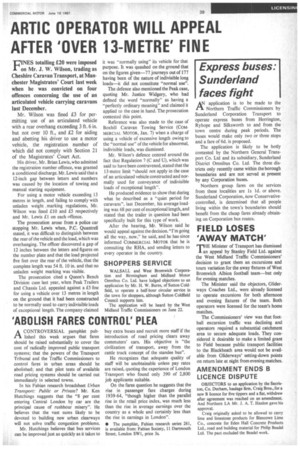ARTIC OPERATOR WILL APPEAL AFTER 'OVER 13-METRE' FINE
Page 41

If you've noticed an error in this article please click here to report it so we can fix it.
VINES totalling £20 were imposed on Mr. J. W. Wilson, trading as Cheshire Caravan Transport, at Manchester Magistrates' Court last week when he was convicted on four offences concerning the use of an articulated vehicle carrying caravans last December.
Mr. Wilson was fined £3 for permitting use of an articulated vehicle with a rear overhang exceeding 3 ft. 6 in. but not over 10 ft., and £2 for aiding and abetting his driver to use a motor vehicle, the registration number of which did not comply with Section 21 of the Magistrates' Court Act.
His driver, Mr. Brian Lewis, who admitted the registration number offence, was granted a conditional discharge. Mr. Lewis said that a 12-inch gap between letters and numbers was caused by the location of towing and manual starting equipment.
For using a motor vehicle exceeding 13 metres in length, and failing to comply with unladen weight , marking regulations, Mr. Wilson was fined £10 and £5 respectively and Mr. Lewis £1 on each offence.
The prosecution arose from a police car stopping Mr. Lewis when, P.C. Quantrell stated, it was difficult to distingnish between the rear of the vehicle and the load, which was overhanging. The officer discovered a gap of 12 inches between the letters and figures on the number plate and that the load projected five feet over the rear of the vehicle, that the complete length was 54 ft. 10 in. and that no unladen weight marking was visible.
The prosecution cited a Queen's Bench Division case last year, when Peak Trailers and Chassis Ltd. appealed against a £5 fine for using a vehicle over 13 metres in length on the ground that it had been constructed to be normally used to carry indivisible loads of exceptional length. The company claimed
it was "normally using" its vehicle for that purpose. It was quashed on the ground that on the figures given-77 journeys out of 177 having been of the nature of indivisible long loads—it did not constitute "normal use". The defence also mentioned the Peak case, quoting Mr. Justice Widgery, who had defined the word "normally" as having a "perfectly ordinary meaning" and claimed it applied to the case in hand. The prosecution contested this point.
Reference was also made to the case of Boxhill Caravan Towing Service (COMMERCIAL MOTOR, Jan. 7) when a charge of using a vehicle of excessive length owing to the "normal use" of the vehicle for abnormal, indivisible loads, was dismissed.
Mr. Wilson's defence centred around the fact that Regulation 7 (C and U), which was said to have been contravened, stated that the 13-metre limit "should not apply in the case of an articulated vehicle constructed and normally used for conveyance of indivisible loads of exceptional length".
He produced evidence to show that during what he described as a "quiet period for caravans". last December, his average loading was 68 per cent of exceptional length, and stated that the trailer in question had been specifically built for this type of work.
After the hearing, Mr. Wilson said he would appeal against the decision. "I'm going all the way, now," he said, and he has since informed COMMERCIAL MOTOR that he is consulting the RHA, and sending letters to every operator in the country.
SHOPPERS SERVICE
WALSALL and West Bromwich Corporation and Birmingham and Midland Motor Omnibus Co. Ltd. have lodged objections to an application by Mr. H. W. Burns, of Sutton Coldfield, to operate a half-hour circular service in the town for shoppers, although Sutton Coldfield Council supports him.
The application will be heard by the West Midland Traffic Commissioners on June 22.




































































































































